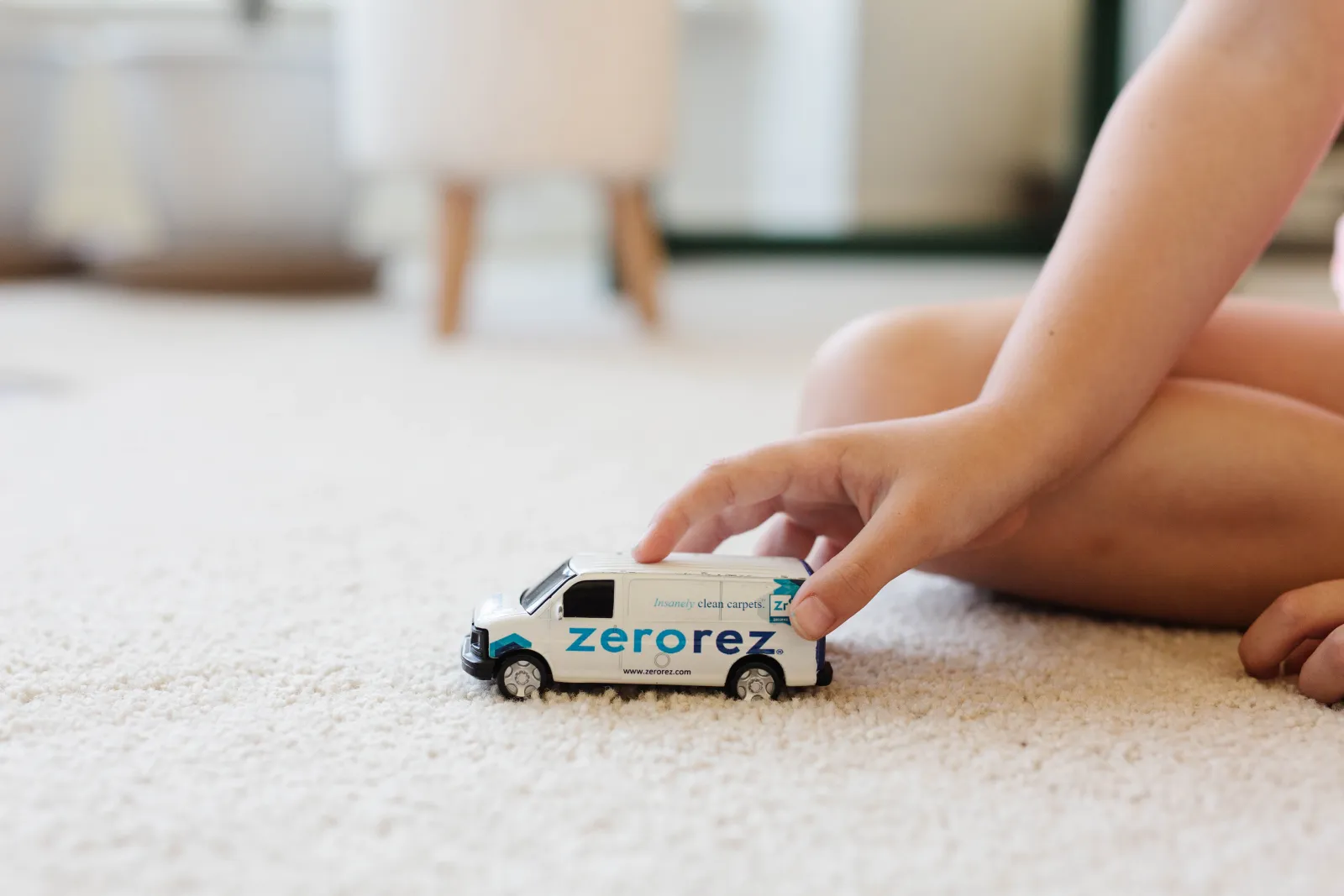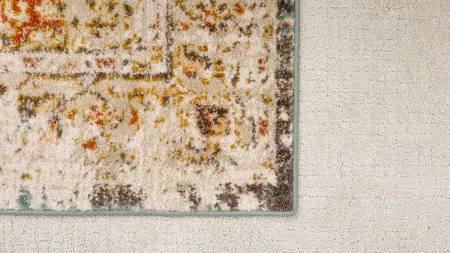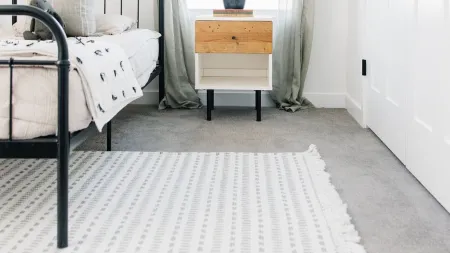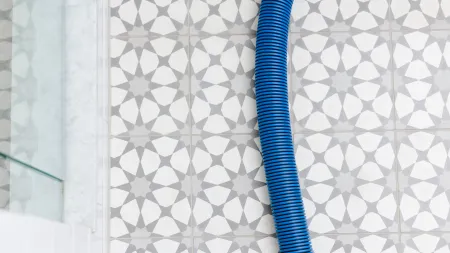What is Nylon Carpet?
A nylon carpet is made of synthetic fiber made up of polymers. The polymers are durable and strong, making nylon carpets resilient to crushing.
After its invention in 1935, the nylon carpet quickly transformed the carpeting industry, leading to higher production and affordable carpets. Nylon comes in two types: type 6 and type 6,6. The difference between the two types is the molecular structure.
Type 6,6 discharges low static electricity, and its colorfastness is higher than that of type 6 nylon. Over the years, type 6 has undergone some improvement, making it almost like type 6,6 in terms of colorfastness, longevity, and resiliency.
Read on as we discuss nylon carpets, their pros and cons, and more.
What Is Nylon Carpet?
Nylon carpet is made from a synthetic fiber (petroleum-based polymer). After the processing, nylon fibers mimic silk, explaining why the carpets are soft to the touch. Due to the strength and resilience of synthetic, nylon carpets are durable.
About 15 years after nylon's discovery, the fiber quickly transformed the carpeting industry. Nylon was more affordable and available than natural fibers, making it possible to produce higher quantities of carpets within a short time. This also made nylon carpets more affordable and a favorite for most residential flooring.
What Is Nylon Carpet Made Of?
Nylon carpet is made of synthetic fiber. This synthetic fiber is strong, making the nylon carpets withstand abrasion well. Nylon carpet retains its original appearance and texture well.
What Is the Best Nylon Carpet?
The best nylon carpet is the 6,6; is more resilient, resistant to fading, and more durable than the 6 type. Nylon 6,6 carpets have double strands of carbon atoms, making them tougher than the type 6 type, hence ideal for families with pets and young kids.
Nylon 6,6 has built-in static protection, producing less static electricity.
Are Nylon Carpets Any Good?
Yes, nylon carpets are good for people with minimal cleaning time daily. They're low-maintenance due to their ability to resist dust and stains.
They're also great for high-traffic areas due to their resilience and durability. Below are some of the pros (and cons) of nylon carpets.
What Are the Nylon Carpet Pros and Cons?
Pros
Durable: Due to the fiber's strength, nylon carpets last up to 15 years when properly maintained. They withstand wear and tear well.
Resilient: Nylon fibers bounce back after compression. So, after exposure to high traffic or cleaning using hot water extraction methods, the nylon carpet fibers bounce back, returning to their initial appearance.
Ease of maintenance: Nylon carpets resist stains well and don't trap dust, making them a great choice for allergy sufferers. They also don't absorb moisture easily, making them resistant to mold and mildew development. To keep your nylon carpets clean, you only need to vacuum them regularly and steam clean them every 12 to 18 months or twice yearly if you have pets and small kids.
Versatile: Nylon carpets are available in many styles, colors, and patterns, making it easy to pick a perfect match for your home or office decor.
Cons
Expensive: Nylon carpet flooring is among the most expensive types of flooring due to its longevity, resilience, and ease of maintenance.
Static electricity: Nylon carpets build up and discharge static electricity, mostly in dry environments.
Softness: Nylon carpet fiber isn't soft compared to most other fibers.
Is Nylon Carpet Easy to Clean?
Nylon carpet is easier to clean because it resists stains and dust better than most natural carpets.
Since nylon carpets resist moisture, you can quickly clean a spill as soon as it happens before it penetrates the fibers and becomes a stubborn stain.
Vacuum your nylon carpets once a week or twice if you have kids and shedding pets.

Does Nylon Carpet Off-Gas?
Nylon carpet off-gas. Off-gassing is a natural process involving releasing Volatile Organic Compounds (VOCs). New nylon carpets release VOCs for up to three days (72 hours).
When VOCs are released into the air, they can have short-term and long-term effects when you inhale them. People with cardiovascular or respiratory diseases, babies and children, and elderly persons are the most adversely affected by VOCs.
VOCs may lead to the worsening of cardiovascular or respiratory diseases, and any underlying health problem in the elderly may worsen.
Other groups of people, including the healthy ones, may experience short-term effects such as dizziness, throat, eye, and nose irritation, and feeling nauseated because of inhaling VOCs. Extended exposure to these harmful compounds could cause certain types of cancers, respiratory problems, and heart diseases.
To reduce exposure to VOCs and improve indoor air quality after buying and installing nylon carpets, here's what you need to do:
Choose nylon carpets with low VOCs. Carpets with the Green Label Plus certification release lower VOCs but come at a higher cost.
After buying a new nylon carpet, adequately ventilate your room by running fans, opening the windows, and using an air purifier for at least three days.
Regularly clean the carpet using a vacuum that has a HEPA filter.
Does Nylon Carpet Fade in the Sun?
Nylon carpets hold their color well but can fade when exposed to direct sunlight for an extended period. The color depth also affects the fading rate; darker nylon carpets fade faster. Higher quality nylon carpets fade less than poor quality.
Ultra Violet (UV) resistant treatments lower the fading rate by up to 75%.
How Long Does Nylon Carpet Last?
What is the lifespan of nylon carpet? You ask. According to Zerorez, how long carpeting lasts depends on its quality, type of fiber, and maintenance. For example, a high-quality nylon carpet could last up to 15 years under good maintenance.
Nylon Carpet Pricing
Nylon carpet cost varies based on quality, size, style, location, foot traffic, installation process, and where you're buying. The installation cost is higher if you have stairs in your home/office.
Homes that experience high-foot traffic require more dense nylon carpets to withstand high pressure. These types of carpets may cost up to $33 or more per square yard. Carpets for moderate foot traffic could cost about $28, and medium foot traffic, about $23. In contrast, low-foot traffic nylon carpets could cost about $18.
According to the carpet professor, a medium-quality residential nylon carpet with a carpet face weight of 32 to 45 ounces could cost between $25 to $40 or more per yard. A high-quality residential nylon carpet with a carpet face weight of 45 to 65 ounces could cost between $35 to $55 or more per yard.
Such carpets have a lifespan of between 15 to 20 years if you take good care of them.
What Is Solution Dyed Nylon Carpet?
Solution-dyed nylon carpet is made from synthetic fibers dyed individually to set the color quickly. Dye mixing takes place before the fiber strands are spun into yarn, making the dye difficult to remove.
Solution-dyed nylon (SDN) carpets are also treated with additional chemicals to improve their characteristics and performance.
What Are the Benefits of Solution-Dyed Nylon?
SDN carpets have various benefits.
Resistant to Fading
Since dye penetrates through the yarn during the dying process, SDN carpets are highly resistant to fading or bleaching because the dye is locked into the fibers. SDN carpets are great for areas that are constantly exposed to direct sunlight.
Resistant to Stains
The process of adding the dyes at the production stages makes SDN carpets stain-resistant because spills don't adhere to the fibers to leave stains. This makes SDN carpets ideal for young families and those with pets.
Ease of Cleaning
Since SDN carpets are stain-resistant, cleaning pets and other messes is easier. As a rule of thumb, always fix messes soon after they happen.
What Is a Nylon Frieze Carpet?
Nylon frieze carpet is the modern version of the old shag carpet from the 60s and 70s but with a knobby, clean look. Most people prefer nylon frieze carpets because they hide footprints and dirt well, making them easy to maintain. However, they can be challenging to deep-clean.
Nylon frieze carpet is highly durable due to its tight twists, making it resistant to compression even under high traffic. The carpet can be solid or multi-colored.
Since they have high twists, nylon frieze carpets are less likely to fray, explaining why they last longer than most other types.
They also have long, thick, plush material, making them soft and comfortable, especially during cold seasons. They're also dense, so they dampen noise.
Are Low-Pile Nylon Carpets Good?
Low-pile nylon carpets are good for people on a budget because they're cheaper. They're easy to clean, hence ideal for pet parents. They rarely show wear and tear, making them good for commercial and residential areas experiencing high foot traffic.
They have shorter, tight fabric loops like the Berber carpets, making them more durable than the high pile options.
They may feel uncomfortable to walk on and are more challenging to clean than high-pile nylon carpets, explaining why they're cheaper.
Zerorez Cleans Nylon Carpets!
Though nylon carpets are easy to maintain because of their resistance to stains, they still need to be deep cleaned annually.
If you have pets, you must deep-clean your nylon carpets once or more every 12 months. At Zerorez, we offer professional nylon carpet cleaning services at an affordable price.
You can call for a free quote or contact one of our Zerorez locations for cleaning services.



